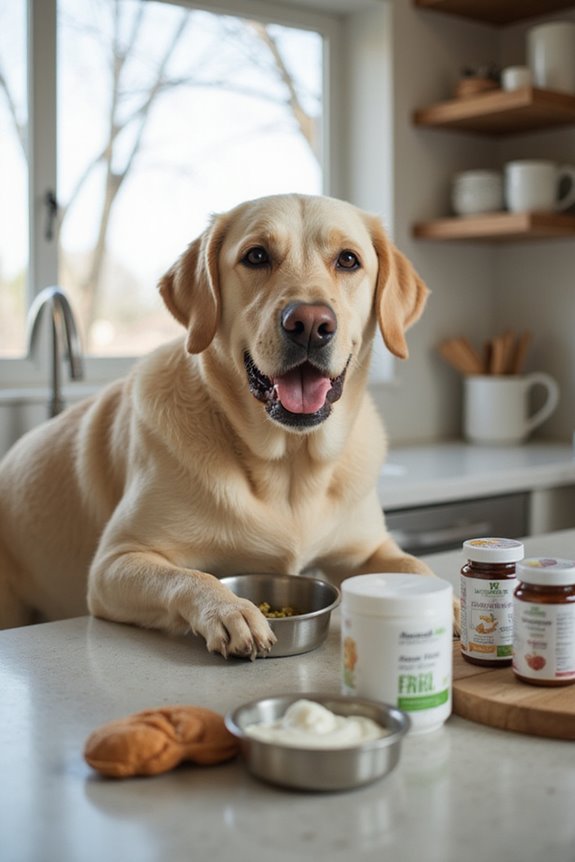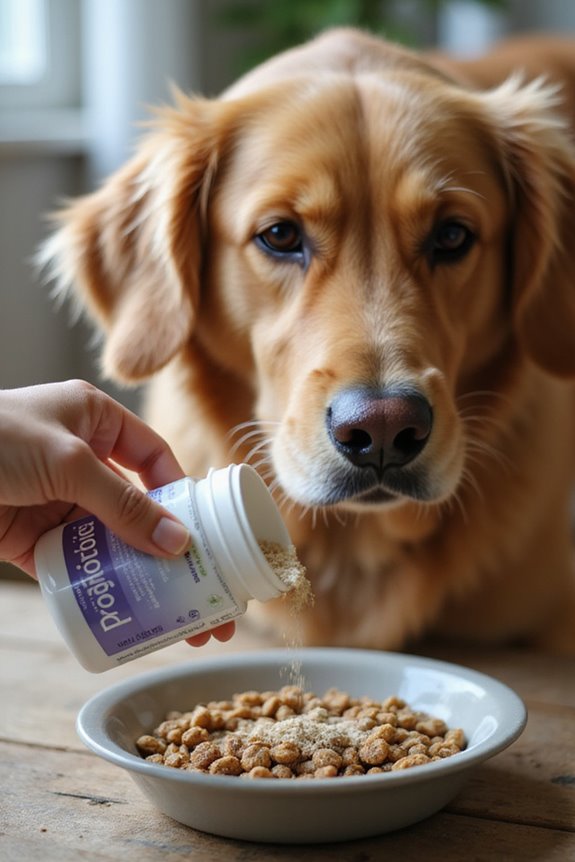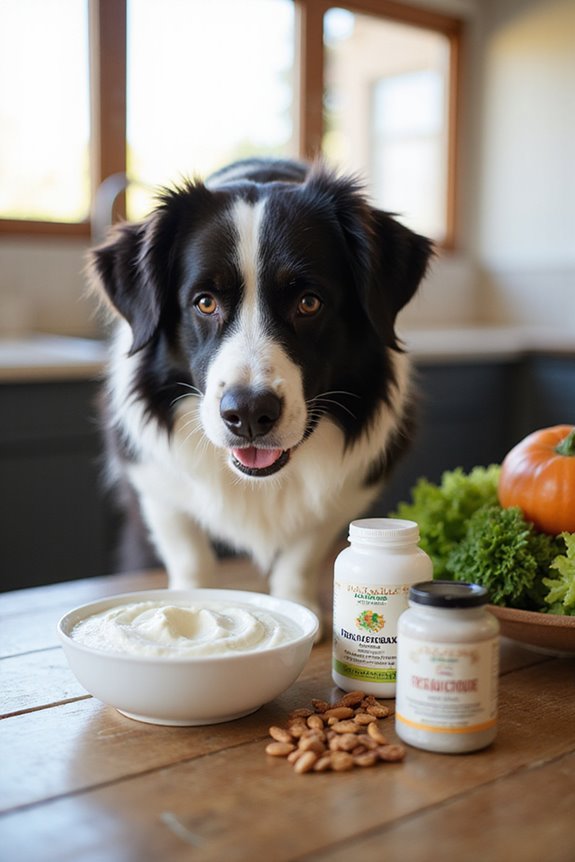Probiotics play an essential role in dog health by enhancing digestive function, supporting immune response, and improving mental well-being. They restore balance to gut microbiota, which aids in nutrient absorption and produces important short-chain fatty acids. Additionally, specific strains can boost immunity, reduce anxiety, and regulate cortisol levels. Selecting clinically documented strains and ensuring proper administration are important. These factors contribute to overall health and resilience in dogs, laying the foundation for further exploration into their benefits.
Key Takeaways
- Probiotics enhance digestive health by restoring gut microbiota balance and improving nutrient absorption.
- They support the immune system by normalizing gut flora and assisting in pathogen defense.
- Probiotics positively impact mental health, reducing anxiety and stress levels in dogs.
- They play a role in disease prevention by enhancing gut barrier function and decreasing infection risks.
- Selecting the right probiotics involves choosing clinically documented strains and appropriate administration methods for optimal results.
Benefits of Probiotics for Digestive Health
Probiotics offer significant benefits for the digestive health of dogs, particularly by enhancing the balance of gut microbiota. These beneficial bacteria help restore the population of good microbes, which is essential for proper digestion. By normalizing intestinal dysbiosis, probiotics improve diversity and functionality, optimizing nutrient absorption and overall gut health.
Key benefits include:
- Support for the production of digestive enzymes, aiding in the breakdown of complex food components.
- Increased expression of tight junction proteins, improving gut lining integrity and reducing permeability.
- Production of short-chain fatty acids that inhibit pathogenic bacteria, creating a healthier gut environment.
Given the stressors dogs face, such as antibiotics or dietary changes, probiotics can help mitigate adverse effects, fostering a more resilient gastrointestinal system.
Probiotics and Immune System Support

Maintaining a healthy immune system is essential for dogs, especially since a considerable portion—about 70%—is located within the gastrointestinal tract. Probiotics play a pivotal role in immune enhancement by normalizing gut flora. Specific probiotic strains, like Lactobacillus and Bifidobacterium, directly support immune function, managing yeast levels and reducing infection risks.
These beneficial microorganisms compete with harmful bacteria, limiting their growth and assisting in pathogen defense. Regular intake of probiotics not only decreases intestinal permeability but also controls inflammation, reducing allergic reactions. In addition, pregnant dogs supplemented with probiotics show markedly higher immunoglobulin levels in colostrum, providing critical immunity to newborn puppies. Daily probiotic supplementation can therefore be an essential investment in long-term immune health for your furry companion.
Mental and Behavioral Health Effects of Probiotics

Benefits include:
- 90% of dogs displayed reduced anxiety symptoms, such as less barking and jumping.
- 83% had lower cortisol levels, indicating lower stress responses.
- These probiotics improve neurotransmitter production, enhancing mood regulation.
Incorporating probiotics into your dog’s diet can be an essential part of their behavioral health plan, potentially leading to improved emotional states and a happier life. Always consider probiotic supplementation within a thorough approach to canine wellness.
Selecting and Administering Probiotics

When looking to improve your dog’s gut health, selecting the right probiotics is essential. Here are key aspects to evaluate:
- Probiotic Strains: Choose products with clinically documented strains specific to canine health. Multiple strains can enhance microbial diversity.
- Dosage Guidelines: Follow recommended CFU levels based on your dog’s size and health. Administer two hours apart from antibiotics and continue for 2–4 weeks after antibiotic therapy.
- Quality Assurance: Opt for probiotics with guaranteed CFUs at expiration and verified through third-party testing.
- Forms of Probiotics: Assess capsules, chewable treats, powders, or liquids based on ease of administration.
- Storage: Maintain potency by storing in cool, dry places and following manufacturer guidelines on refrigeration and shelf life.
Consult your veterinarian for personalized recommendations.
Probiotics in Disease Prevention and Treatment

Selecting the right probiotics for your dog isn’t just about improving digestive health; it also plays a significant role in disease prevention and treatment. Probiotics can indeed normalize intestinal dysbiosis and enhance gut barrier function by increasing the expression of tight junction proteins. Research shows that they may shorten illness duration in cases of acute diarrhea and gastroenteritis, reducing antibiotic dependency. While clinical trials demonstrate varying degrees of probiotic efficacy, they often involve small sample sizes and high bias risks, stressing the need for more rigorous studies. In addition, probiotics also support immune function, decreasing the risk of infections and allergic reactions. Their role in maintaining a balanced microbial environment could offer broader health benefits, potentially enhancing your dog’s overall resilience.
Frequently Asked Questions
Can Puppies Benefit From Probiotics at Any Age?
Oh sure, if you think puppies can’t handle probiotics at any age, you might as well believe unicorns exist! Trust me, their gut health flourishes with proper puppy nutrition. Probiotics are a little miracle worker!
Are All Dog Probiotics the Same?
No, not all dog probiotics are the same. I’ve noticed that probiotic strains and ingredient differences can greatly impact their effectiveness. It’s essential to choose products that suit your dog’s specific needs for ideal health.
How Long Does It Take to See Probiotic Effects?
Seeing results from probiotics isn’t instant; it varies by individual dog response. While some show improvement within days, others might take weeks. Patience is key, as the probiotic absorption timeline can differ for every pup.
Can Overuse of Probiotics Harm My Dog?
Absolutely, I’ve seen that overusing probiotics can upset my dog’s gut balance. Keeping the right probiotic dosage is essential; too much can lead to digestive issues like diarrhea or constipation. Always consult a vet for guidance.
Are There Any Side Effects of Giving Probiotics to Dogs?
Imagine watching your pup’s belly rumble; giving probiotics sometimes stirs digestive issues. If I’m not careful with probiotic dosage, we might face diarrhea or bloating. It’s important to monitor them closely, just in case!


